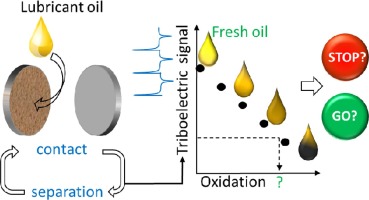
Kimya Bölümü Dr. Öğretim Üyesi Hasan Tarık Baytekin ve ekibi, makinelerin düzgün ve uzun ömürlü çalışabilmesi için önem taşıyan motor yağı oksidasyonunu çevrim içi olarak ölçen bir teknik geliştirdi. Applied Surface Science dergisinde “Online lubricant degradation monitoring using contact charging of polymers/Polimerlerin temas elektriklenmesini kullanarak çevrimiçi yağlayıcı bozunma izleme” başlığıyla yayımlanan çalışma hem çevre kirliliğini azaltan hem de ekonomik bir kontrol tekniği sunuyor.
Motor gibi hareketli parçaları olan makinelerin uzun süre ve efektif çalışabilmesi için, çalışma sırasındaki sürtünme ve aşınmanın önlenmesi amacıyla yağlanmaları gerekir. Ancak kullanım sırasında yağların oksitlenmesi, kimyasal ve fiziksel özelliklerinin değişmesi, yağlama performansının bozulmasına yol açar. Diğer taraftan motor yağı üreticilerinin önerdiği “değişim süresi”, genellikle yağ ürünlerinin ömrünün tahmin edilmesine dayanıyor. Bu tahmini hesaplama, özellikle şehir içi sürüş gibi değişen motor sıcaklıkları ve hızlarında genellikle yanlış olur. Her ne kadar yağların çalışma sırasında değişen çeşitli kimyasal ve fiziksel özelliklerine yönelik farklı analiz yöntemleri geliştirilmiş olsa da yağ durumunun izlenmesi için uygun maliyetli, üretimi kolay, makine tarafından uygulanabilen bir yönteme yönelik ihtiyaç sürüyor.
Yağ kullanıldıkça yağın durumunu izlemenin daha doğru, daha ekonomik ve çevre dostu bir yöntem olacağı ve yağ bozulmasının zamanında tespit edilmesine yönelik, mevcut yöntemlerden daha pratik yeni yöntemlere ihtiyaç olmasından yola çıkan Dr. Baytekin ve ekibi, yağ bozunmasının izlenmesi için basit bir yöntem geliştirdi. Bu yöntemle yapılan analizler, başka analizlere ihtiyaç olmaksızın yağın oksitlenmeye başladığını gösteriyor. Dr. Baytekin ve ekibinin TÜBİTAK destekli araştırması, motor yağlarının oksidasyonunun, yağa temas eden selülozun yaygın sentetik polimerlere dokundurulmasıyla üretilen sürtünme elektriklenmesi sinyallerindeki değişikliklerin takip edilerek izlenebileceğini ortaya koyuyor. Bu yeni çevrimiçi yağ oksidasyonu izleme yöntemi, ekonomik kayıpların önlenmesinin yanı sıra, bir damla atık yağın 100 litre temiz suyu kirletmesi nedeniyle, çevrenin korunmasına yardımcı olma potansiyeli taşıyor.
Makalenin tamamına https://doi.org/10.1016/j.apsusc.2022.152593 bağlantısından erişilebilir.

Together with his team, Dr. Hasan Tarık Baytekin, Assistant Professor at the Department of Chemistry, has developed a new technique that monitors the oxidation of engine oils online, which is essential for the proper and long-lasting operation of machines. The study, published in Applied Surface Science with the title “Online Lubricant Degradation Monitoring Using Contact Charging of Polymers,” presents an economical tracking method that also reduces environmental pollution.
For machines with moving parts to work effectively for a long time, they must be lubricated to decrease friction and reduce wear. However, oxidation of oils and changes in their chemical and physical properties during their use cause deterioration in lubrication performance. Furthermore, the recommended “change time” for the lubricant provided by the lubricant manufacturers is usually based on a vague estimate of the end-of-life of the oils. This estimation is often inaccurate, especially with varying engine temperatures and speeds, such as driving in a city. Although various analysis methods have been developed focusing on the different chemical and physical properties of oils changing during operation, there is still a need for a cost-effective, easy-to-manufacture, and machine-applicable method to monitor the condition of oils.
Based on the fact that it would be more accurate, more economical, and more eco-friendly to be able to track the condition of the oil as it is used, and also considering the need for new and more practical methods to detect oil deterioration in time, Dr. Baytekin and his team developed a simple technique to monitor degradation. The analyses based on this method successfully indicate when the oil begins to oxidize without needing further analysis. The TÜBİTAK-funded research study of Dr. Baytekin and his team reveals that the oxidation of engine oils can be monitored by tracking the changes in the triboelectric signals produced by tapping the oil-wet cellulose to common synthetic polymers. In addition to preventing economic losses, this new online oil oxidation monitoring technique also has the potential to help protect the environment since a single drop of lubricant oil can contaminate 100 liters of water.
The full article can be accessed at https://doi.org/10.1016/j.apsusc.2022.152593.